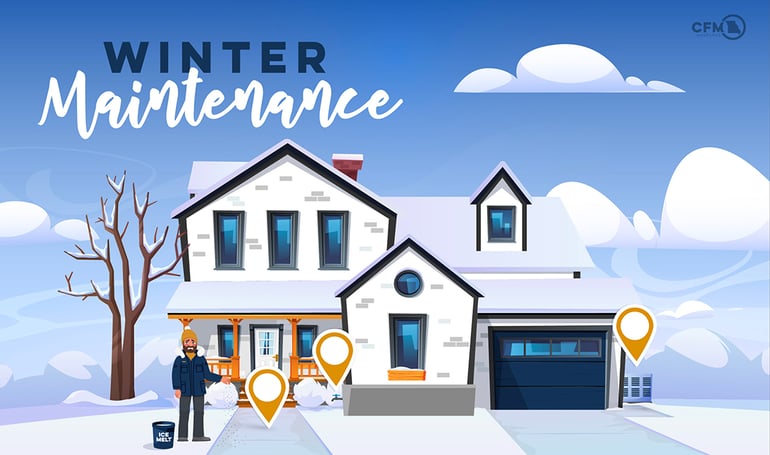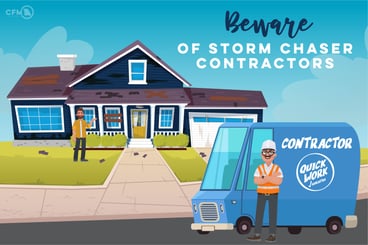Explore practical seasonal maintenance tips to weatherproof your home and keep claims at bay.
There's a saying in Missouri that goes, "If you don't like the weather, wait five minutes."
Mother Nature's unpredictability doesn't prevent us from being prepared for whatever she throws our way. From scorching summers to frosty winters, each season presents unique challenges for homeowners here in Missouri. After all, it wouldn't be the Midwest without sporadic weather activity, would it?
With the CFM Team's help - including valuable advice from CFM's Property Claims Manager - and Agent Angie's insurance expertise, Parker & Penny can avoid claims by weatherproofing their home. Journey through their property and see how they plan to prep for each season, making claims connections along the way.
Spring: Storms Are Blooming

To safeguard their home in the spring, Parker & Penny follow these tips - also highlighted in our Spring Storm Prep Blog:
1. Inspect your roof for any signs of damage or missing shingles.
If you notice curled, cracked, or discolored shingles flying loose from your roof, it's imperative to contact your CFM Agent. They can file your claim and get an insurance adjuster out for inspection.
Important Reminder: Beware of Storm Chaser Contractors.
These folks are out-of-town roofing contractors who travel around the country following the paths of storms. Their goal? To target vulnerable homeowners they can easily exploit. These deceiving contractors promise helpless homeowners quick, cheap repair work. They'll even throw in the added promise of influencing insurance companies to pay out the future claim no matter what.
To avoid being left high and dry by a fraudulent company who installed a poorly constructed roof over your head, remember to always contact your CFM agent first if you suspect you have roof damage following a storm.
If you've encountered a fraudulent contractor, learn what you can do to report them.
2. Clear out gutters and downspouts to ensure proper drainage away from your home.
In fall and winter, gutters can become clogged with leaves and debris. When stuffed to the max, there's a potential for them to overflow or pull away from your home, leading to standing water.
Detached gutters and resulting water puddles around your home's foundation are problematic. Properly flowing gutters protect your home’s exterior, interior walls, and foundation from costly damage - so keep them clean.
3. Check your outdoor spigot and water line before turning on the hose to water your lawn. Do you see cracks or noticeable wear and tear from winter’s freezing temperatures? It pays to be observant. A faulty spigot or water line can lead to expensive damage, like foundation wall cracks and basement or crawlspace leaks.
Claim Connection: CFM Property Claims Manager, Ben Benno, warns that his department sees mounting claims in the spring due to cracked or damaged water lines and resulting flood concerns that start at the spigot.
“One area especially prone to frozen water pipes is your outdoor spigot. When it gets very cold, the water in your hose can freeze. This can cause the pipe that brings water into your house to burst. As a result, a flood may occur. Removing your hose from the spigot in the winter and inspecting the water lines in the spring before using it is critical."
Summer: Beat The Heat

Summer brings sunshine and warmth but can also bring scorching temperatures and fire risks during drought conditions. To keep their home cool, comfortable, and safe in the summer, Parker and Penny start with these measures:
1. Consider installing ceiling fans in rooms that receive a lot of sunlight to improve air circulation.
Ceiling fans can directly impact cooling costs, allowing you to raise your thermostat by 4°F without sacrificing comfort.
For instance, if you prefer a cool indoor temperature of 70°F, set your thermostat to 74°F and turn on your ceiling fans. Ensure your ceiling fans spin counterclockwise in the summer for optimal cooling. In the winter, switch them to spin clockwise for better heat circulation.
2. Trim back any overgrown trees or branches that could pose a threat during high winds.
Additionally, secure outdoor furniture to prevent it from being tossed around. Clear away dry plants and bushes near your home to lower the risk of fires. This is especially important during hot, dry, and windy summer days. Whenever feasible, opt for fire-resistant materials for landscaping and construction.
3. Seal your HVAC ducts and ensure your air conditioning system is in good working order.
Over time, air ducts in your home can develop leaks. This can make your heating and cooling less efficient. As a result, you may end up with higher bills. Most HVAC contractors offer sealing services, but you can attempt it yourself if you're comfortable.
4. Address any negative slopes around your home’s foundation to prevent water from seeping into your basement.
Improve drainage by grading the soil around your home using dirt. This will divert water away from your foundation rather than toward it. Follow this step-by-step guide for the best results.
Claim Connection: Ben says his team often sees foundation problems in summer due to too much rainwater. His advice to address this issue proactively? Don’t be afraid to get your hands a little dirty:
"Depending on the amount of dirt needed to form proper sloping around your foundation, you may need to contact a local contractor for delivery or machinery rentals. The type of dirt used is also crucial. Fill dirt is dense and ideal for creating the base barrier. Use fill dirt to create mounds that alter the elevation or grade of the ground around your foundation, protecting it from water flow. Finish the job off with a thin layer of topsoil."
Fall: The Winds Of (Temperature) Change Settle In

Prepare your home for fall leaves, colder weather, and winter storms as seasons change rapidly. Getting ready is important. Parker & Penny start their fall maintenance prep inside and work their way outdoors:
1. Seal windows and doors by first checking for noticeable drafts.
Use weatherstripping or caulking to save energy, stay comfortable, and prevent mold caused by moisture in any gaps. Weather sealing is a DIY-friendly project – learn how here.
2. Inspect your chimney or wood stove for potential damage before firing them up during chilly fall evenings.
Regular cleaning and inspection of your chimney can remove creosote buildup and uncover any wear and tear or leaks.
Wood stove safety is equally important. Look at the door and gasket, clean out ashes, replace damaged firebricks, and make sure the door handle closes securely. Never leave your fireplace or wood stove unattended.
3. Keep fire safety top of mind if you choose to burn dead leaves.
Burning leaves is riskier than bagging them for recycling, but there are ways to do it safely. Only burn leaves or tree debris on clear days with little to no wind, and keep your burn pile more than 50 feet away from the structure of your home. Ensure no low-hanging tree branches or power lines are near the smoke, and never leave an active burn pile unattended.
Claim Connection: Fire dangers are always a concern in the CFM Claims Department. Ben says his team sees most fall fires caused by burn piles left too close to homes. He suggests anyone choosing to burn seasonal debris should know exactly what they can and can’t burn.
“You should only burn debris from trees - leaves, twigs, and smaller branches. These materials burn relatively quickly and retain little heat when extinguished, making them safer. Burning processed materials like pallets, building lumber, or cardboard is a no-go. Also, avoid thicker branches and logs, as they retain their heat and can cause flare-ups after you walk away from an extinguished pile.”
Winter: Baby, It's Cold Outside

Winter can be harsh, with freezing temperatures and heavy snowfall posing significant challenges for homeowners. Before the cold sets in, Parker and Penny brush up on the 10 Best Cold Weather Safety Tips for them and their home. Then, they follow these steps:
1. Insulate your pipes and protect your outside faucets from freezing temperatures.
Close any shut-off valves serving outside faucets. Then, open the outside faucet to drain the line. You may loosen a small cap on the faucet to facilitate draining. You can also help protect exterior faucets with an insulated cover.
If it is very cold, insulate pipes near the outside walls. Alternatively, let faucets drip slowly to prevent them from freezing.
2. Ensure that your heating system is in good working order.
We advise having your heating system inspected by a professional once a year. In between inspections, look out for warning signs that may indicate the need for immediate attention:
- Noisy belts with unusual screeching or whining sounds could indicate worn or damaged belts connected to the blower motor.
- Poor performance may be because of blocked ducts, old, dirty filters, misadjusted burners, or a failing blower motor.
- Erratic function patterns could result from a faulty thermostat or a misadjusted furnace.
3. Repair damaged walkways, driveways, and steps immediately.
These hazards are dangerous year-round but pose an especially significant risk when the weather turns icy. Look for cracks wider than 1/8-inch, uneven sections, and loose railings on steps. Check for disintegration of asphalt or washed-out materials on loose-fill paths.
DIYers can manage most small repair jobs, but experienced professionals should handle major repairs. Additionally, ensure you have stocked up on rock salt, sand, or gravel and have a sturdy shovel. Slippery steps or walkways pose a real fear and significant liability concern from a claims perspective, so prioritize safety.
Claim Connection: Burst pipes are one of the most devastating claims Ben and his Team see in the winter. He emphasizes the importance of maintaining your pipes, especially in vacation homes or if you'll be away for extended periods during cold snaps:
"If you're away, set your thermostat to at least 65 degrees and open cabinets with plumbing to let warm air circulate. You can add some insulation to your pipes and faucets with a quick trip to your local hardware store. We’ve seen many homeowners return from vacation to a flood of devastation caused by burst pipes. The same happens to vacation homeowners who don’t winterize their lake homes in time. Being proactive is the best way to avoid a mess."
Big Picture: Avoiding Insurance Claims Keeps Costs Down For Everyone Involved
Homeowners can save big bucks by taking simple steps to prevent all-too-common risks, which in turn benefits them, their insurance agent, and the insurance company in the long run. Here's how preparedness directly benefits policyholders:
- Lower Premiums: Insurance companies often provide a variety of exclusive discounts, which results in lower premiums, to policyholders who make an ongoing effort to reduce risks. Homeowners can save on insurance year after year by keeping their property safe and well-maintained to qualify for those lower premiums (think CFM's Claim-Free Discount). Or, maybe you have a home security system at your property to better prevent theft and break-ins (think CFM's Central Fire and/or Burglary Alarm System Discount).
- Preservation of Claims History: This isn't breaking news by any means (especially coming from an insurance company), but policyholders can maintain a positive claims record by filing fewer claims. While it may sound repetitive, emphasizing the importance of proactive claims prevention can't be overstated. Doing so can lead to lower insurance rates and provide access to more unique coverage options.
- Protection of Property Value: Taking care of your home prevents damage from weather, accidents, or unexpected events. This ensures that your home retains its value long term. To easily uphold your property's value while managing a busy schedule, consider enlisting the assistance of a handyman or groundskeeper. You can quickly find individuals seeking to earn extra income by offering landscaping or home maintenance services on local bulletin boards, both in-person and online.
- Mitigating Additional Damages: Promptly addressing maintenance issues can help prevent secondary damages that may occur if problems are left unattended. For example, repairing a small leak in the roof promptly can prevent water damage to other parts of the home, reducing the overall extent of damage and associated claim costs.
Gain & Maintain Confidence Through Every Season
Keeping your home safe and secure requires a proactive mindset and regular upkeep. This is essential for feeling confident in every unpredictable season. Protect your home and loved ones by reducing risks and taking care of your property.
CFM's Awesome Agents and Claims Team network is committed to helping homeowners safeguard their investments. With their knowledge and help, you can trust that your home is safe and prepared for any challenges it may face.




Your Comments :